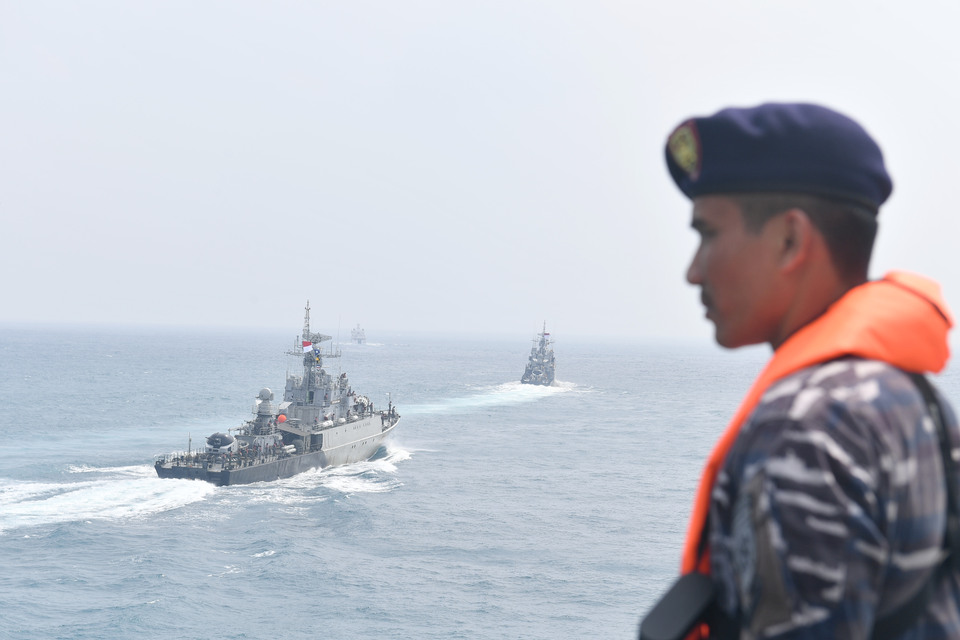Indonesian Nationalism vs. International Law

"Internationalism cannot flower if it is not rooted in the soil of nationalism, and nationalism cannot flower if it does not grow in the garden of the internationalism," so said Indonesia's first president Soekarno in one of his many powerful speeches, underlining the relations between Indonesian nationalism and how it should interact outside the then-budding nation.
Currently though, many Indonesians see the world outside of the unitary republic solely from a staunchly Indonesian point of view, often coupled with an ultra-vehement form of nationalism, if not quite chauvinism.
The recent standoff with China in the North Natuna Sea, the Flight Information Region (FIR) takeover from Singapore and the sinking of foreign vessels caught fishing illegally in Indonesian waters, were in some ways the results of a rising nationalism that – in defiance of Soekarno's prescription – pays little attention to how international law actually works.
This is when in international legal discourse, there are many different views and opinions on how the relationship between state domestic policies and international law should be negotiated.
Eric Posner from the University of Chicago offers the pragmatic view that states should follow international law only when it serves their national interest. For the most recent example, one only needs to look at Donald Trump's policies.
Luckily, this is not the majority view. Many experts – academics, politicians – still believe in the sanctity of international law and that states would do best to respect it.
Historically speaking, Indonesia has been a firm believer in international law. Since its independence in 1945, the republic has always sought recognition for its political moves in international forums through mechanisms devised by international laws.
Indonesia has even inherited the spirit of international law and anti-colonialism in its 1945 Constitution, which stipulates that since independence is the inalienable right of all nations, colonialism must be abolished everywhere in the world.
Indonesia has also benefited from international law by getting recognition as an archipelagic state. Thanks to the United Nations Conference of the Law of the Sea, Indonesia's territory has more than doubled.
Indonesian internationalists such as Mochtar Kusumaatmadja and Hasjim Djalal have played a big role not only in taking advantage of international law but also in shaping it.
But in the 21st century, growing populism and unilateralism have meant that states are becoming more powerful and state-centered point of view more dominant in international relations.
Multilateralism is taking a backseat, as can be seen in US withdrawals from international treaties and Brexit.
In Indonesia, an ultra-nationalist point of view is also becoming more dominant. In the aforementioned standoff with China, the public demand was for strong-armed actions from the Indonesian government to protect its sovereign rights in the North Natuna Sea, be damned with the facts and consequences.
Many are also against the government's decision to support Palestinian independence and Uighur Muslims, arguing that doing so will not benefit Indonesia's national interests.
These pragmatic views do not align with Indonesia's commitment to promote international peace and can be dangerous.
Indonesia should not forget that taking part in creating a world order based on freedom, perpetual peace and social justice is not only an international obligation but also demanded by our own Constitution.
The Indonesian public should understand that international law and international negotiations are not a zero-sum game, but a quid pro quo interaction.
Indonesia can use international law to promote its national interests in international forums, but it should also make sure it does not breach or avoid its international obligations under international law.
Aristyo Darmawan is a lecturer and researcher at University of Indonesia's Center for International Law Studies. He is currently attending The Hague Academy of International Law in the Netherlands.
Tags: Keywords:POPULAR READS
Rupiah Declines Against Dollar Amid Geopolitical Unrest
The Indonesian rupiah depreciated against the US dollar in Tuesday's trading session, driven by escalating tensions between Iran and IsraelNasdem Vows to Honor the Constitutional Court Ruling on 2024 Presidential Election Dispute
Nasdem's Willy Aditya commits to respect the Constitutional Court's ruling on the 2024 presidential election dispute.Waskita Beton Precast Secures $63.7m New Contracts in Q1
Concrete maker Waskita Beton Precast posted new contracts worth Rp 1.03 trillion (around $63.7 million) in the first quarter of 2024.Jokowi Calls for Internal Meeting to Prepare for Economic Fallout from Iran-Israel Conflict
Minister Airlangga Hartarto announced President Jokowi's plan to hold an internal meeting on Tuesday to address the Iran-Israel conflict.Coach Shin Tae-yong Voices Outrage Over Referee Decisions After Indonesia's Defeat to Qatar
Indonesia's AFC U-23 defeat to Qatar leaves Garuda squad with 9 players, bottom of Group A.Popular Tag
Most Popular






















